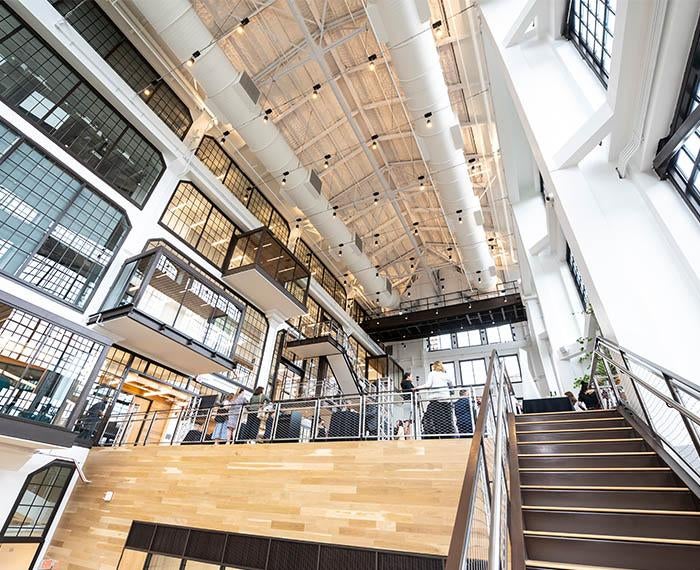
Subscribe to Pittwire Today
Get the most interesting and important stories from the University of Pittsburgh.The Assembly earned LEED Gold status

The Assembly, a century-old building transformed into a world-class, state-of-the-art life sciences research and innovation facility, has been awarded LEED Gold certification. Created by the U.S. Green Building Council, LEED is the most widely used green building rating system globally and an international symbol of excellence.
Starting out a Model-T assembly line and showroom for the Ford Motor Company at 5051 Centre Ave., The Assembly was developed by Wexford Science & Technology, LLC, and achieved LEED Gold based on its design, construction and operations practices focused on improving environmental and human health.
The Assembly is the second LEED certified space leased by the University of Pittsburgh and the 18th project under University auspices to receive a LEED certification since 2005, when Pitt’s McGowan Institute of Regenerative Medicine was awarded the University’s first LEED Gold certification.
Pitt officials made the announcement on Oct. 26, National Sustainability Day. This newest LEED Gold certification ties into campus-wide and community efforts including the Plan for Pitt, the Pitt Sustainability Plan and longtime commitment to third-party certified green buildings.
“The University of Pittsburgh is proud of our long history of LEED certified buildings, which demonstrate our commitment to healthy and high performing spaces and places. For nearly two decades, Pitt has used LEED certification to demonstrate that our buildings are designed, constructed and operated to the highest levels of sustainability,” said Aurora Sharrard, executive director of sustainability at Pitt. “We are excited for The Assembly to become our largest leased LEED Gold space, demonstrating our commitment to sustainability and carbon neutrality by 2037 both on and off campus.”
Designed by ZGF and built by Turner Construction, The Assembly earned its LEED Gold designation for measurable sustainability strategies and solutions, including diverting nearly 90% of construction waste from the landfill. 56% of the renovation materials were regional and 32% were recycled. The building also uses less energy and water than standard spaces, is close to public transit, provides bicycle storage and changing rooms, and has 30 electric vehicle chargers on site.
— Jared Stonesifer, photography by Aimee Obidzinski

